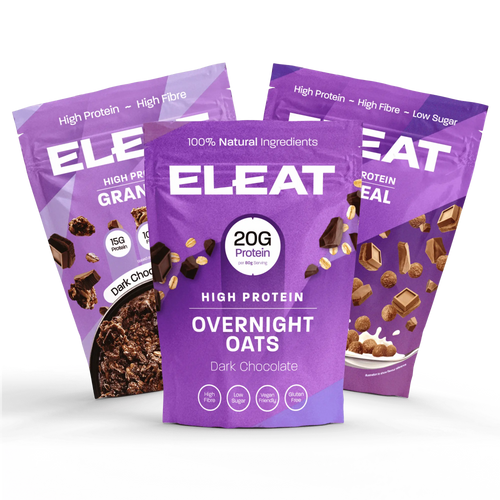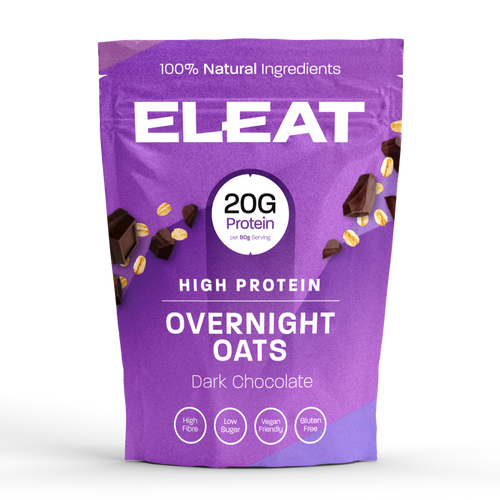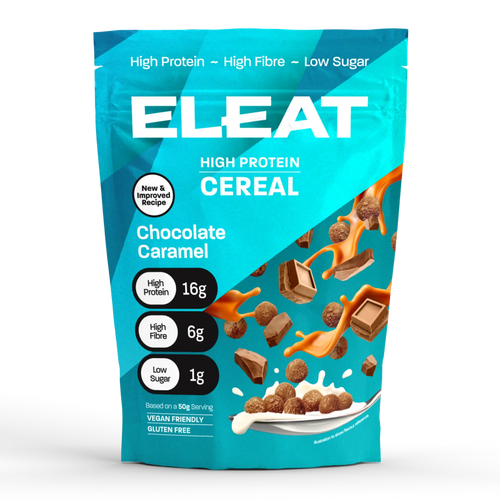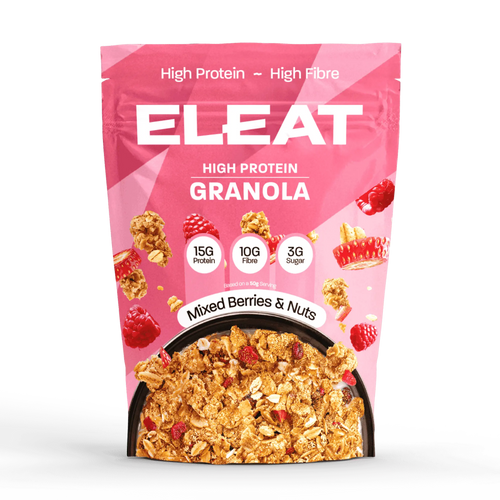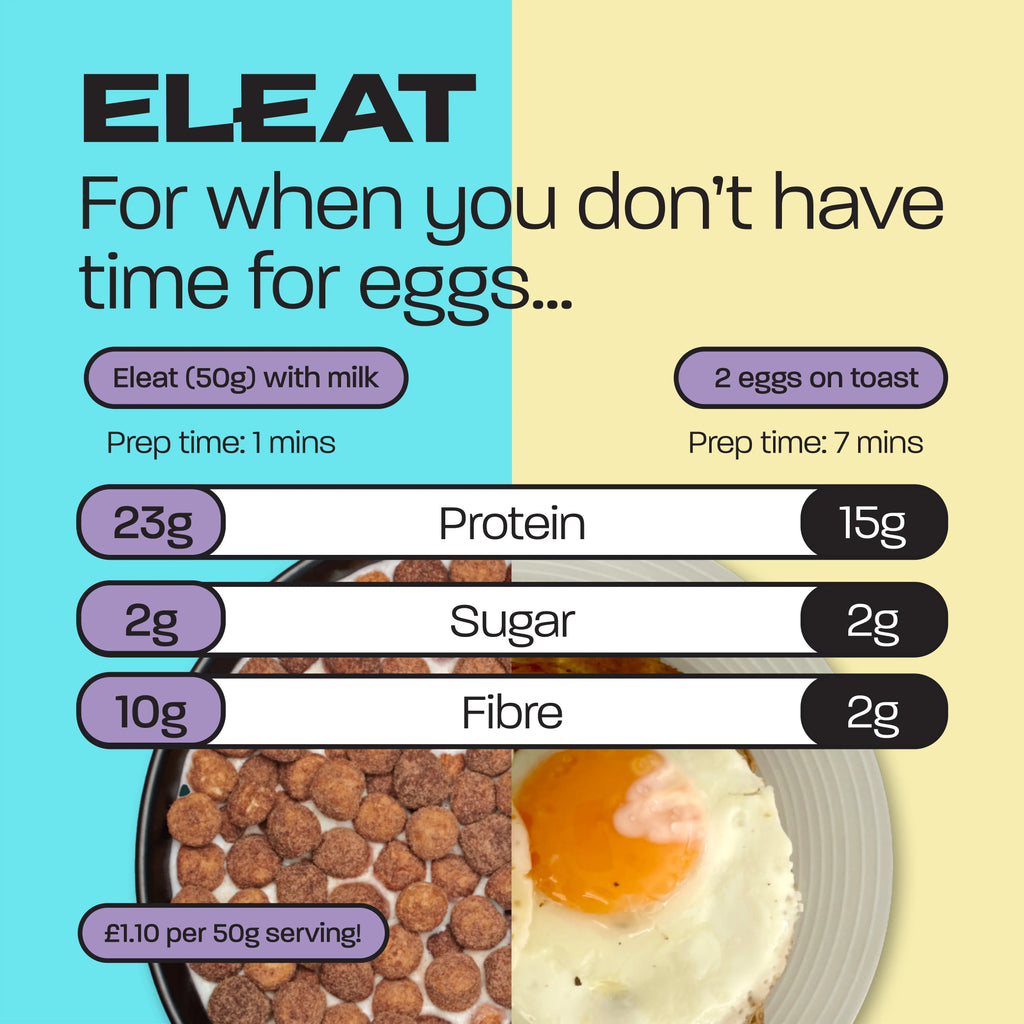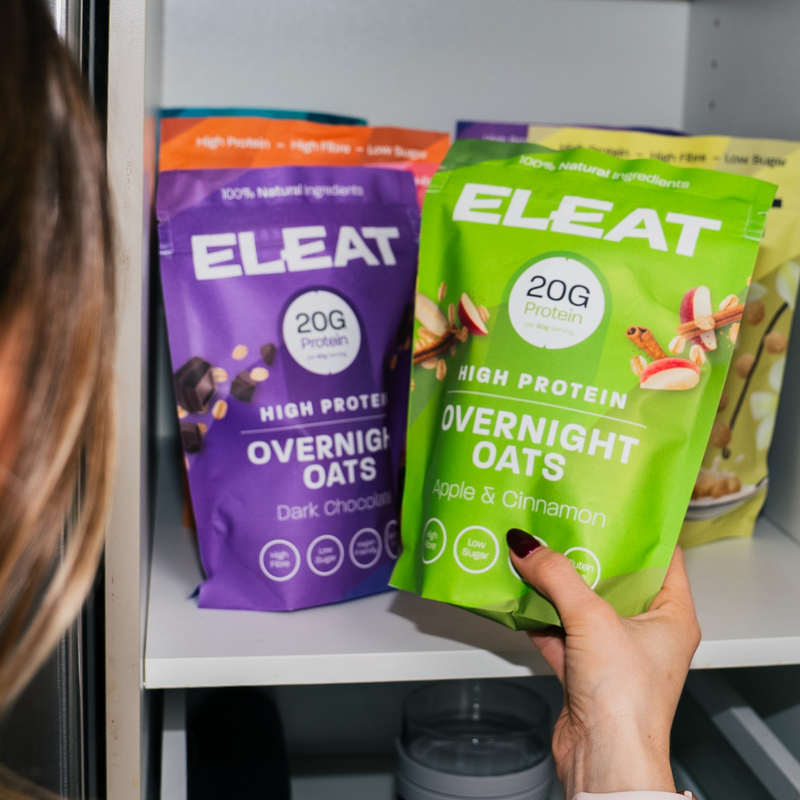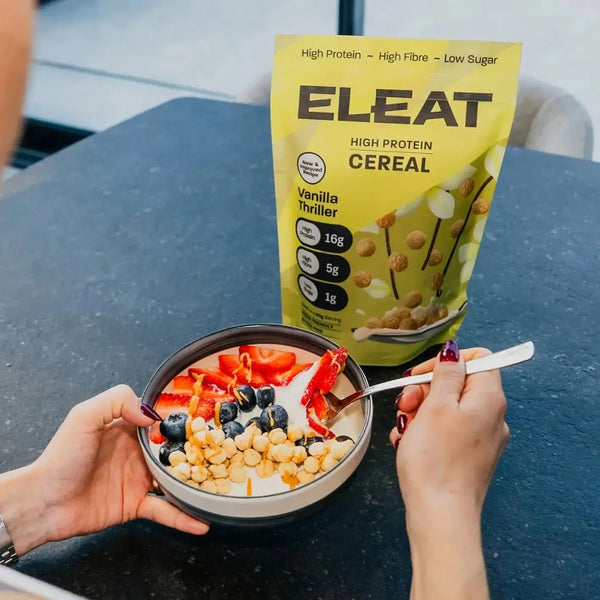In this article:
Breakfast has been recognised as the most important meal of the day for a long time. It provides our bodies with the essential fuel needed to kickstart the morning. So, why do so many of us not treat it this way?
Breakfast on a weekend often looks very different to breakfast in the week, but if anything it’s most important during the week. Many of us enjoy healthy breakfasts that give us energy and help us focus throughout the day. But, we just don’t have the time.
In recent years there has been a significant shift towards looking after our wellbeing more, we’re not looking to compromise on our nutrition. High Protein Cereals are on the rise as an easy way to get your macros in, but are they really the best option?
We’re going to delve into this debate and examine the pros and cons to of High Protein Cereals vs traditional breakfasts to help you make an informed decision moving forward. Whether you’re an athlete looking to enhance performance, a busy professional seeking convenience, or simply someone trying to be healthier this comparison will provide you with valuable insights on how to start your day.
For the sake of this argument, we’re considering ‘traditional breakfasts’ to be eggs on toast, porridge, supermarket cereal, granola with yoghurt, or peanut butter on toast. Our judgement on high-protein cereals is also based on ELEAT.
What are high-protein cereals?
High-protein cereals are rapidly rising in popularity amongst those who are fed up with the traditional nutrient-lacking, sugar-filled cereals we see every day in supermarkets. High-protein cereals have been specifically formulated to provide a significant boost in protein content compared to other cereals.
Typically, these high-protein cereals are also much healthier than the alternatives in the supermarkets. Generally, they’re low in sugar and high in fibre, and some are full of low GI carbs for slow-releasing energy. These cereals are designed to cater to the health-conscious consumer.
A standard serving of high-protein cereal generally provides between 10 to 20 grams of protein, which is significantly higher than the 2 to 5 grams found in most cereals. ELEAT is between 15-19g of protein per serving.

Nutritional Comparison
This is one of the important aspects of comparison between high-protein cereals and traditional breakfasts, for many this is the reason to make the switch. It’s hard to make an absolute comparison when considering a number of traditional breakfasts relative to high-protein cereal, but we’ve done our best.
Protein Content
Obviously, this is the big winner for high-protein cereal. High protein cereals, ELEAT specifically, offer up to 20g of protein per serving. This significant protein boost comes from soy protein isolate typically, for ELEAT this combined with sunflower protein gives a complete amino acid profile.
If your traditional breakfast is made up of eggs, you’ll be doing pretty well on the protein front. Greek yoghurt and berries are another good example of a high-protein traditional breakfast. But, unfortunately, neither matches ELEAT when paired with milk.
Other Nutrients
Fibre is essential for digestion and can help keep you feeling full for longer. High-protein cereal is also often a good source of fibre. ELEAT is packed with 8g of fibre in every bowl and 3g of prebiotics to help boost gut health.
Many traditional breakfasts are also great sources of fibre, especially porridge, or if you’re eating toast swap it for wholegrain for added fibre.
Sugar and Carbs
Whether high-protein cereals or traditional breakfasts win on this one really depends on what traditional breakfast you’re having.
High-protein cereals are often low in sugar, ELEAT has only 1g per serving and uses a natural sweetener Stevia. ELEAT also contains 17g of low GI carbohydrates, so you won’t experience any sugar crashes and you’re energy will be sustained throughout the day.
If your traditional breakfast is porridge or eggs on toast, then you’ll be pretty well matched to high-protein cereals. However, if you’re having normal cereal, or fruit and yoghurt, you’re sugar content is going to be above 12g per serving.

Health Benefits
The nutritional content doesn’t come without rewards. Both traditional breakfasts and high-protein cereals have varying health benefits.
Muscle Health and Recovery
Protein is essential to promote muscle growth and repair, this makes high-protein cereals an excellent choice for active individuals with this as their priority. The protein content in these cereals provides all nine necessary amino acids needed to support muscle recovery after workouts. A lot of people back-load their protein content and eat larger amounts with their dinner, but regularly consuming high-protein breakfasts can help maintain muscle mass.
Whilst eggs on toast will also help provide you with a helpful amount of protein to start your day, it won’t be to the same amount, and it’s not as easy to prepare - but we’ll get to that!
Energy Levels and Focus
Breakfast is the most important meal of the day because it helps set you up for the day. A balanced breakfast is key to maintaining energy levels and cognitive function throughout the morning.
High-protein cereals help achieve this balance by providing a steady release of energy. The combination of protein, low GI carbs and fibre in ELEAT helps regulate blood sugar levels and provide you with sustained energy, preventing the spikes and crashes that can lead to decreased concentration and fatigue.
Some traditional breakfasts, and traditional cereals that are high in refined carbs and sugar can cause rapid spikes in energy that result in decreased energy in the long run. However, porridge, eggs on toast, and peanut butter on toast offer a good mix of carbohydrates, fibre and some protein allowing for a more sustained energy release.

Convenience and Preparation
A lack of convenience in the preparation of traditional breakfasts, and a lack of time in the mornings is what’s led so many of us to turn to sugar-filled cereals. So, obviously, traditional cereals are just as easy to prepare as high-protein cereals.
But, ELEAT is significantly more convenient with an on-the-go pot option that allows you to have a high-protein nutritious breakfast whenever is best suited to you.
Peanut butter on toast is another traditional breakfast that is incredibly convenient, with little to no preparation time required. However, like traditional cereal, it offers very little nutritious benefit.
In order to gain the nutritious benefits of a traditional breakfast you’d have to be prepared for much less convenience and increase the preparation time. Eggs on toast and porridge both take some time to make and as they’re both warm they lack any portability.
Cost Comparison
When considering a cost comparison, it’s definitely worth considering both price per serving, and value for money.
If we’re looking at purely cost per serving, generally, traditional breakfasts are the more economical option. Porridge and peanut butter on toast will likely both cost at around 50p per serving. Eggs on toast and fruit with yoghurt are still economical, but slightly more expensive at around £1 per serving. However, high-protein cereals are likely to average at around £1.10 per serving.
When considering the nutritional value provided relative to the cost, high-protein cereals often deliver excellent value for money. They are specifically formulated to offer a balanced nutritional profile, and for many the cost of high protein cereals is justified by their nutritional benefits and convenience.

Taste and Variety
Taste and variety is a highly subjective way to compare high-protein cereals and traditional breakfasts. If you’re already enjoying cereal on a daily basis, making the switch to nutritious, high-protein cereals is the obvious option.
ELEAT offers several flavours of high-protein cereal, and there will always be a flavour that suits you best. If you’re not short on time, customising your bowls can be a great way to bring in extra variety - add high-quality peanut butter, or yoghurt and berries!
The variety in traditional breakfasts is significantly broader. This does depend if you’re enjoying a variety of traditional breakfasts, or simply one of them. But, they do give you the opportunity to switch between savoury and sweet options.
Conclusion
High protein cereals, like ELEAT, offer significant advantages; particularly in terms of protein content, convenience and consistent nutritional value. They provide a substantial boost in protein, are low in sugar, high in fibre and offer slow-releasing energy. This makes high-protein cereals the perfect option for those who prioritise their health and want to stay energetic and focused throughout the day.
Traditional breakfasts, such as eggs on toast, porridge, or berries and yoghurt, can also be satisfying and nutritious. They offer a broad variety of flavours and can be more easily customised to suit personal preferences. However, they require more preparation time and lack the same amount of convenience and nutrition as high-protein cereals.
Ultimately, the choice depends on your individual needs and tastes. By knowing the advantages of each option, you can choose the one that fits your health goals and daily schedule. This will help you begin each day with the energy you need to do well.
